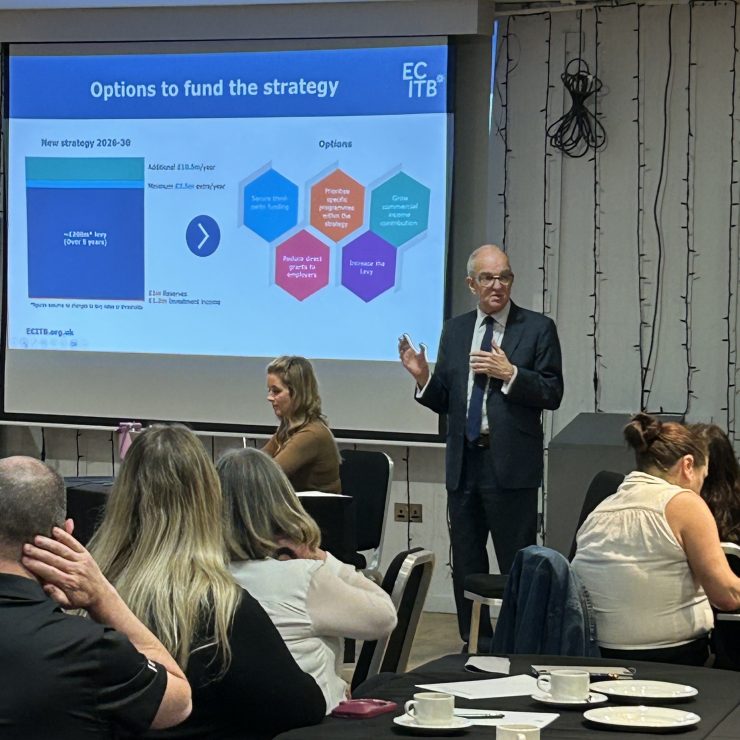The employer-led Board of the Engineering Construction Industry Training Board (ECITB) has unveiled its new strategy, Leading Industry Learning, outlining how it will help to address skills shortages and support industry growth.
The strategy sets out a five-year plan, from 2026 to 2030, to develop the skills needed for the delivery of critical infrastructure projects, energy security and net zero ambitions.
Shaped by insights from employers, training providers, asset owners, the government, trade unions and other industry bodies, the plan reflects the real needs and evolving priorities of the engineering construction industry (ECI).

“The engineering construction industry and its supply chain companies engineer, project manage and install much of the critical infrastructure required across Great Britain.
“Our new strategy sets out how the ECITB will rise to meet the challenges of an increasingly complex and fast-changing external environment and deliver positive, long-term outcomes for our levy payers, the wider workforce and the country.
“Our approach aligns with the UK Government’s mission-driven focus – particularly its goal to transition to clean power and stimulate sustainable economic growth in doing so.
“Moving to a five-year strategy cycle reflects our determination to drive long-term outcomes through significant interventions that can deliver lasting impact.”
Lynda Armstrong OBE
Chair of the ECITB Board

“Our mission to lead industry learning has never been more important than it is now.
“Achieving the outcomes from this strategy will require collaboration and commitment well beyond the ECITB alone.
“We will continue to support our employers through grant funding for mission-critical training. At the same time, we will build upon investments like our Regional Skills Hub funding to address systemic and structural challenges facing the engineering construction industry.”
Andrew Hockey
CEO of the ECITB

ECITB Strategy: Three key pillars
The ECITB forecasts that 40,000 additional workers could be needed for major projects, including those related to net zero, by 2030, placing employers in direct competition for labour from £531bn of infrastructure projects in the wider UK economy.
These projects span a range of sectors, including nuclear new build and decommissioning, renewables, oil and gas, water treatment and food and drink. They will also include hydrogen and carbon capture projects linked to the decarbonisation of the industrial clusters, which are at the heart of the country’s net zero plans.
The 2026-30 strategy aims to help industry meet the workforce volume challenge and prepare for a boom in project activity for engineering construction employers. It is built on three key pillars:
- It will support employers and deliver quality training products and qualifications that meet industry needs as well as robust labour market intelligence to enable better workforce planning.
- It will seek to grow the number of new entrants joining the industry and help employers access a broader, more diverse talent pool. It will also focus on workforce retention, supporting upskilling, reskilling and competence assurance.
- And it will transform skills through strategic investment in regional hubs, harnessing new technologies, modular and blended learning and driving a collaborative approach.
Photo courtesy of INEOS

The ECITB strategy is the culmination of 12 months’ work and extensive consultation. This included ten strategy workshops hosted across England, Scotland and Wales throughout Spring 2025. Its events in the North of England were jointly delivered with the ECIA, and the ECITB extends its thanks again for the association’s support in these.
The open workshops were supplemented by roundtables with specific audiences, including nuclear stakeholders, and an online survey. The feedback gathered through the consultation process is reflected in the final strategy.
The ECITB will present further details of the new strategy along with levy proposals for the 2025 levy consensus* at a series of Regional Forums throughout October. All levy paying employers are invited to participate in the formal consultation process on the Board’s levy proposals.
Pictured: ECITB CEO Andrew Hockey talking to industry partners at one of the strategy consultation workshops. Main: OPITO works with the ECITB on the APTUS energy apprenticeship programme.
* Every three years, the ECITB is required by law to consult on levy rates for the following three-year period. The next consultation (levy consensus) will take place in October 2025.
Read more on the industrial training levy and the levy consensus process





